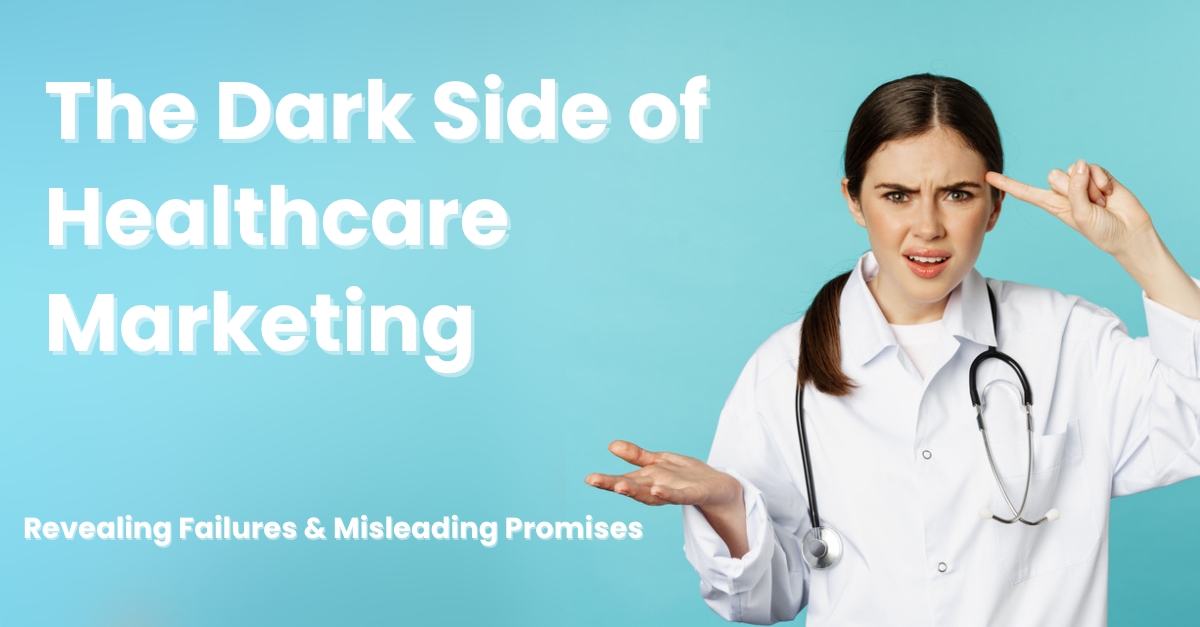
The Dark Side of Healthcare Marketing
The Dark Side of Healthcare Marketing:
Revealing Failures and Misleading Promises
In the world of healthcare marketing, there is a darker side that often goes unseen. Behind the glossy campaigns and persuasive messages, there are failures and false hopes that need to be exposed.
While healthcare marketing plays a crucial role in promoting services and connecting patients with providers, it is essential to shed light on the shortcomings and misleading practices that can harm the integrity of the industry.
Misleading Claims: From exaggerated claims of miraculous cures to misleading testimonials, the dark side of healthcare marketing takes advantage of vulnerable individuals seeking hope and relief. It preys on their desperation, promising quick fixes and instant solutions that often lead to disappointment and wasted resources.
Manipulative Tactics: The unethical tactics employed by some in the healthcare marketing realm tarnish the reputation of genuine practitioners and cast doubt on the entire industry. It is crucial to hold marketers accountable for their actions and demand transparency, honesty, and ethical standards. Some marketers employ manipulative tactics to create a false sense of urgency or scarcity. Urging patients to act immediately or using fear-based messaging can lead to impulsive decisions and regret later on.
Exploitation of Testimonials: Testimonials can be a powerful tool, but on the dark side of healthcare marketing, they are often manipulated or fabricated to sway opinions. False endorsements and misleading success stories can mislead patients into making ill-informed choices.
Lack of Transparency: Transparency is essential in healthcare marketing, yet the dark side often lacks it. Hidden fees, undisclosed risks, and undisclosed affiliations can deceive patients, compromising their trust in the healthcare system.
Unethical Targeting: The dark side of healthcare marketing involves targeting vulnerable populations with false promises. Preying on individuals with serious illnesses or limited access to healthcare, marketers exploit their desperation for personal gain.
The Call for Change: It’s time to shed light on these failures and false hopes in healthcare marketing. The industry must hold itself to higher ethical standards, prioritizing honesty, transparency, and patient well-being. Regulatory bodies and professionals must work together to enforce accountability and ensure the integrity of healthcare marketing practices.
Case Study: The Misleading Promise of Miracle Weight Loss Solution
In the world of healthcare marketing, one prominent case of misleading promises and false hopes revolves around a weight loss solution that claimed to be a miraculous breakthrough. Let’s explore this case study to understand the impact of such deceptive marketing practices.

Background: A healthcare marketing agency launched an aggressive campaign promoting a weight loss product. The product claimed to provide remarkable results with minimal effort, promising individuals a quick and effortless path to their dream body.
The Deception: The marketing materials for this weight loss solution showcased before-and-after photos of individuals who had supposedly achieved dramatic weight loss within a short period. Testimonials from satisfied customers further reinforced the idea of a revolutionary solution.
The Reality: Upon closer examination, it was revealed that the testimonials and before-and-after photos were manipulated or, in some cases, entirely fabricated. The weight loss solution itself lacked scientific evidence, and experts raised concerns about its potential health risks.
The Impact: Many individuals desperate to lose weight fell prey to this misleading marketing campaign. They invested their time, money, and hope in a product that failed to deliver on its promises. Some experienced adverse effects, while others felt demoralized and frustrated by their lack of results.
Lessons Learned: This case study serves as a cautionary tale, highlighting the importance of critical thinking and research when encountering healthcare marketing claims. It emphasizes the need for transparency, evidence-based information, and ethical marketing practices within the industry.
Moving Forward: Healthcare marketing agencies, regulatory bodies, and healthcare professionals must collaborate to establish guidelines that ensure truthfulness, accuracy, and accountability in marketing campaigns. Consumers must be empowered with information and encouraged to consult trusted healthcare professionals before making health-related decisions.
At Digital Ananth, we are committed to promoting ethical healthcare marketing practices that prioritize patient well-being and build trust. With our expertise in healthcare marketing, we offer innovative solutions that drive results while maintaining the highest ethical standards.
Disclaimer: All characters mentioned in this case study are fictional. Any resemblance to actual individuals, doctors, hospitals, or healthcare institutions is purely coincidental. This case study is intended for illustrative purposes only and does not represent any specific person, entity, or real-life scenario.


